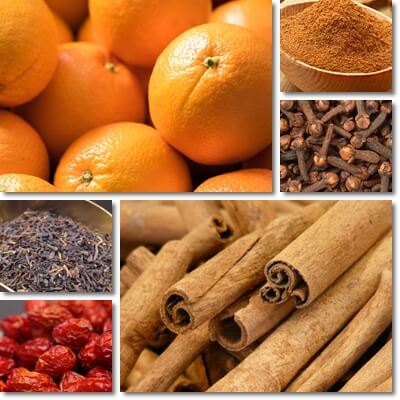Orange tea is an unusual tea in the sense that it’s almost always a blend or tea mix rather than just orange. Nonetheless orange tea is a healthy tea, full of wonderful benefits for health, plenty of which are derived from the added ingredients so you can’t really go wrong with it. Orange tea boosts energy levels and combats tiredness and fatigue. It is a source of anti-inflammatory and antioxidant components and is good for blood pressure, blood sugar and diabetes, digestion and metabolism, among other benefits.
What is in orange tea?
Orange tea is usually a tea blend or mix that contains dried and ground orange peel together with a selection of spices, fruits and tea herbs, typically cinnamon, sweet cloves, star anise, licorice, cardamom, ginger root, black pepper, rose hip, hibiscus, hawthorn, rooibos, jasmine, passion fruit, apple, blackberry leaves, safflower petals, rose petals, chamomile, lemongrass, lemon and very little orange essence or orange peel essential oil. The base for orange tea is typically green tea or black tea, sometimes white tea, but there are plenty of caffeine-free options with a red fruit base such as rose hips, rooibos or hibiscus, or with roasted chicory root.
Plain orange peel tea also exists, but it’s commonly home-made, and so is orange tea with orange peel and juice. There’s also an orange leaf tea. Some brands will also list natural flavorings in the ingredients list such as grapefruit flavor, raspberry or other berry flavors which may be those exact same fruits or just beets added for color.

What are the benefits of orange tea?
Orange tea derives its benefits for health not just from the orange peels, which is the primary ingredient, but from every single ingredient present in the tea mix. So whatever orange tea you may choose, it’ll likely prove an extremely healthy option. Below we will address the biggest benefits of orange tea derived primarily from the star-ingredient, orange peel, and a few other ingredients commonly present in the tea blend.
Anticancer properties
Orange tea is typically made using dried and ground orange peel. The outer rind and the spongy inner white part of the rind, the pith or albedo, contain hesperidin which is a bioflavonoid, a highly biologically active antioxidant. Studies show hesperidin exerts anticancer properties via immunomodulatory, antimutagenic, anti-inflammatory and apoptosis-inducing activities. Hesperidin has been found to scavenge for reactive oxygen species called free radicals, reduce inflammation, induce apoptosis and cell cycle arrest in cancer cells and inhibit tumor cell metastasis, angiogenesis and chemoresistance (source).
Benefits for high blood pressure
There is plenty of research that shows hesperidin found in the spongy inner white rind of oranges and outer rind demonstrates anti-hypertensive effects, actively contributing to healthier blood pressure numbers (source). Hesperidin is believed to target nitric oxide metabolism (source) and it is the nitric oxide-mediated vasodilation that achieves anti-hypertensive effects (source).
The blood pressure lowering benefits of orange tea come from hesperidin in the inner white part of the orange peels, but also from additional ingredients such as hawthorn and rose hip which are known anti-hypertensive herbs (also see the benefits of hawthorn tea).

Benefits for low blood pressure
If your blood pressure numbers are too low and you are always feeling somewhat tired, lightheaded or dizzy, then you can consider caffeinated orange tea. Essentially orange peel tea with a green tea, black or white tea base, it helps elevate blood pressure slightly and corrects hypotension. However, avoid orange tea with hawthorn and rose hips which can have the opposite effect and lower your blood pressure even more.
Also see the benefits of rose hip tea.
Immune system support
Drinking orange tea provides some degree of immune system support derived from biologically active antioxidant components such as hesperidin with scientifically proven immunomodulatory activities, but also carotenoid antioxidants responsible for the color of the orange rind such as beta-carotene and alpha-carotene with vitamin A activity and various other polyphenols. Other spices, herbs and fruits also contribute to benefits for the immune system.
Anti-inflammatory benefits
Preclinical studies and clinical trials investigating hesperidin, and its aglycone hesperetin, demonstrated the two components have anti-inflammatory effects, helping lower levels of inflammation in the body, with benefits for various diseases (source 1, source 2). Other spices, fruits and herbs typically found in orange tea blends also provide anti-inflammatory benefits to various degrees, including cinnamon, black pepper, hawthorn, rose hip, hibiscus and more.
Digestive benefits
Orange tea can help soothe the stomach and aid digestion. The fact that it’s consumed warm and hydrates further contributes to the health of the digestive system. Other ingredients typically found in orange tea have carminative properties, helping expel air from the stomach and digestive tract and relieve excessive burping, flatulence (gas) and associated bloating and painful stomach cramps. Cinnamon in particular has carminative benefits and is a common spice associated with orange peel in orange tea.
Also see the benefits of cinnamon tea.
Benefits for a slow metabolism
Orange peel which is the main ingredient in orange tea does not boost metabolism, at least not significantly and not in the amounts it is consumed from the tea, and definitely to the same degree as other ingredients. Other ingredients common in orange tea instead do. Orange tea with a base of green tea, black tea or white tea is a source of caffeine which increases metabolism, boosting energy levels and exerting a stimulant action that favors sustained physical and mental activity and energy expenditure.
Of course, it can be argued that bioactive hesperidin in orange peel can help boost a slow metabolism via lipid and cholesterol-lowering properties and insulin-sensitizing activities (source) that regulate the metabolic function and even encourage weight loss.
Antidiabetic benefits
Studies show biologically active components in orange peel such as naringinin and naringenin have potent antidiabetic effects, exerting insulinotropic effects, stimulating insulin secretion, and insulin-sensitizing effects, improving insulin resistance (source). This could potentially mean that orange peel tea can exert protective effects against type 2 diabetes, and possibly help with blood sugar management.
Calming effect that aids sleep
Caffeine-free orange teas are made with roasted and ground chicory root which is a popular alternative to coffee, but without the caffeine. Moreover, other ingredients in orange tea, such as rose hips and hawthorn, lower blood pressure numbers and induce relaxation, actively promoting sleep. Hibiscus, chamomile and lemongrass have a calming effect at the level of the nervous system and have similar benefits for insomnia. You can also spice up your orange tea with tart cherry juice for added benefits for sleep. Find out more about the benefits of cherries and cherry juice for sleep.
Boosts energy levels
It’s actually not the orange peel, but the caffeine in the black, white or green tea base which boosts energy levels. Caffeine has a stimulant effect on the nervous system, and promotes alertness, as well as raises blood pressure numbers, resulting in a tonic, energizing effect. However, because about half of commercially available orange teas are made with a black tea or green tea base, more rarely white tea, this is a benefit worth mentioning.
